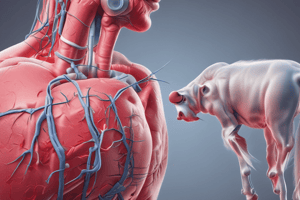Podcast
Questions and Answers
Which type of murmur is characterized by a late crescendo murmur with midsystolic click that occurs after the carotid pulse?
Which type of murmur is characterized by a late crescendo murmur with midsystolic click that occurs after the carotid pulse?
- Mitral valve prolapse (correct)
- Aortic stenosis
- Pulmonary Flow Murmur
- Supraclavicular Flow Murmur
Which murmur is best heard at the left infraclavicular area and is continuous and machinelike?
Which murmur is best heard at the left infraclavicular area and is continuous and machinelike?
- Still’s Murmur
- Venous Hum
- Aortic Regurgitation
- Patent Ductus Arteriosus (correct)
Which condition is associated with a holosystolic, harsh-sounding murmur loudest at the tricuspid area?
Which condition is associated with a holosystolic, harsh-sounding murmur loudest at the tricuspid area?
- Coronary artery abnormalities
- Myocarditis
- Ventricular septal defect (correct)
- Mitral valve prolapse
Which murmur is characterized by a holosystolic, high-pitched 'blowing' murmur that is loudest at the apex and radiates to the axilla?
Which murmur is characterized by a holosystolic, high-pitched 'blowing' murmur that is loudest at the apex and radiates to the axilla?
Which murmur is benign and originates from turbulent flow in the left ventricular outflow tract?
Which murmur is benign and originates from turbulent flow in the left ventricular outflow tract?
What is the most common non-cardiac cause of chest pain in children?
What is the most common non-cardiac cause of chest pain in children?
Which dysrhythmia is associated with SA node dysfunction?
Which dysrhythmia is associated with SA node dysfunction?
Which type of murmur is associated with turbulent flow from arterial branches off the aortic arch?
Which type of murmur is associated with turbulent flow from arterial branches off the aortic arch?
What should be avoided in the treatment of bradydysrhythmias in infants and children with Wolff-Parkinson-White syndrome or congestive heart failure?
What should be avoided in the treatment of bradydysrhythmias in infants and children with Wolff-Parkinson-White syndrome or congestive heart failure?
Which characteristic is used to evaluate murmurs in pediatric cardio disorders?
Which characteristic is used to evaluate murmurs in pediatric cardio disorders?
Which type of murmur is characterized by a crescendo-decrescendo ejection murmur that is loudest at the heart base?
Which type of murmur is characterized by a crescendo-decrescendo ejection murmur that is loudest at the heart base?
What is the most common noncardiac cause of syncope in children?
What is the most common noncardiac cause of syncope in children?
What is a red flag for syncope that warrants further evaluation?
What is a red flag for syncope that warrants further evaluation?
Which murmur is associated with turbulent flow from the jugular veins and superior vena cava?
Which murmur is associated with turbulent flow from the jugular veins and superior vena cava?
Which type of syncope accounts for 90% of non-cardiac related cases?
Which type of syncope accounts for 90% of non-cardiac related cases?
Which murmur is considered pathologic and is characterized by a murmur from turbulence in the right ventricular outflow tract?
Which murmur is considered pathologic and is characterized by a murmur from turbulence in the right ventricular outflow tract?
Which type of murmur is benign and originates from turbulent blood flow in dilated breast blood vessels?
Which type of murmur is benign and originates from turbulent blood flow in dilated breast blood vessels?
Which condition is characterized by a sudden loss of consciousness and postural tone due to transient cerebral underperfusion with spontaneous recovery?
Which condition is characterized by a sudden loss of consciousness and postural tone due to transient cerebral underperfusion with spontaneous recovery?
What is the most common cardiac cause of chest pain in children?
What is the most common cardiac cause of chest pain in children?
Which murmur is characterized by an early diastolic, decrescendo, high-pitched 'blowing' murmur?
Which murmur is characterized by an early diastolic, decrescendo, high-pitched 'blowing' murmur?
What type of murmur is associated with ventricular septal defect?
What type of murmur is associated with ventricular septal defect?
What type of syncope accounts for 10% of cases and is often associated with arrhythmia?
What type of syncope accounts for 10% of cases and is often associated with arrhythmia?
Flashcards are hidden until you start studying
Study Notes
Murmurs
- Late crescendo murmur with midsystolic click occurring after the carotid pulse is characteristic of mitral valve prolapse.
- A continuous and machinelike murmur best heard at the left infraclavicular area is characteristic of patent ductus arteriosus.
- A holosystolic, harsh-sounding murmur loudest at the tricuspid area is associated with tricuspid regurgitation.
- A holosystolic, high-pitched 'blowing' murmur loudest at the apex and radiating to the axilla is characteristic of mitral regurgitation.
- Benign murmurs originate from turbulent flow in the left ventricular outflow tract.
- Turbulent flow from arterial branches off the aortic arch is associated with a supravalvular aortic stenosis murmur.
- A crescendo-decrescendo ejection murmur loudest at the heart base is characteristic of pulmonary stenosis.
- A murmur from turbulence in the right ventricular outflow tract is pathologic and characteristic of pulmonary stenosis.
- Benign murmurs originate from turbulent blood flow in dilated breast blood vessels.
Syncope
- The most common non-cardiac cause of chest pain in children is musculoskeletal pain.
- The most common non-cardiac cause of syncope in children is vasovagal syncope.
- A red flag for syncope that warrants further evaluation is a family history of sudden death.
- Vasovagal syncope accounts for 90% of non-cardiac related cases.
- Cardiac syncope accounts for 10% of cases and is often associated with arrhythmia.
Dysrhythmias
- Sinus node dysfunction is associated with SA node dysfunction.
- In the treatment of bradydysrhythmias in infants and children with Wolff-Parkinson-White syndrome or congestive heart failure, digoxin should be avoided.
Evaluation of Murmurs
- Characteristics used to evaluate murmurs in pediatric cardio disorders include location, quality, intensity, duration, and radiation.
Studying That Suits You
Use AI to generate personalized quizzes and flashcards to suit your learning preferences.




